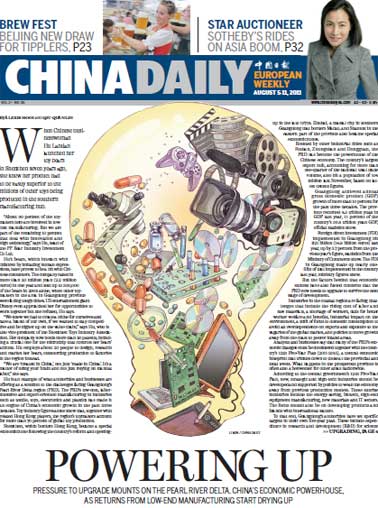Photos
Japan's Hiroshima city marks atomic bombing
Updated: 2011-08-06 17:01
(Agencies)
HIROSHIMA, Japan - The Japanese city of Hiroshima on Saturday marked the 66th anniversary of the bombing, as the nation fights a different kind of disaster from atomic technology - a nuclear plant in a meltdown crisis after being hit by a tsunami.
The site of the world's first A-bomb attack observed a moment of silence at 8:15 am Saturday (2315 GMT Friday) - the time the bomb was dropped on August 6, 1945, by the United States in the last stages of World War II.
|
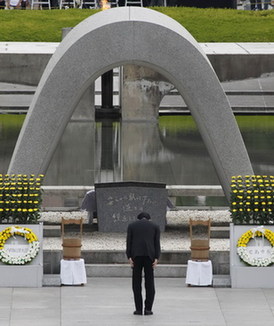 Japan's Prime Minister Naoto Kan bows to a cenotaph dedicated to atomic bomb victims during a ceremony at the Peace Memorial Park in Hiroshima August 6, 2011, on the 66th anniversary of the world's first atomic bombing on the city. Kan vowed on Saturday to challenge the "myth of safety" of nuclear power while marking the 66th anniversary of the atomic bombing of Hiroshima, a city that has now started questioning its long embrace of nuclear energy's peaceful use. [Photo/Agencies]
|
Prime Minister Naoto Kan on Saturday laid a wreath of yellow flowers at Hiroshima Peace Memorial Park and reiterated Japan's promise to never repeat the horrors of Hiroshima, whose suffering continues today because of illnesses passed down over generations.
Japan has long vowed never to make or possess nuclear weapons, but embraced nuclear power as it aimed to rebuild and modernize after the war.
Crowds of people clutching Buddhist prayer beads bowed their heads Saturday in commemorating the dead as pigeons were released during the solemn gathering repeated every year before the skeletal dome of a bomb-ravaged building.
The prime minister, in his speech, also touched on Japan's more recent nuclear catastrophe at the northeastern Fukushima Dai-ichi power plant, where a massive tsunami set off by a 9.0 magnitude earthquake on March 11 knocked out backup generators that powered the plant's cooling mechanisms.
Kan repeated a promise to embrace renewable energy and rely less on nuclear power.
"Japan is also working to revise its energy policy from scratch," Kan said. "I deeply regret believing in the security myth of nuclear power."
Hiroshima mayor Kazumi Matsui stopped short of calling for a nation without nuclear power while retierating his pledge to work toward a world without atomic weapons.
But he acknowledged that the trust people had in the safety of nuclear power had been damaged.
"Some seek to abandon nuclear power altogether with the belief that Mankind cannot co-exist with nuclear energy, while others demand stricter regulation of nuclear power and more renewable energy," he said.
|
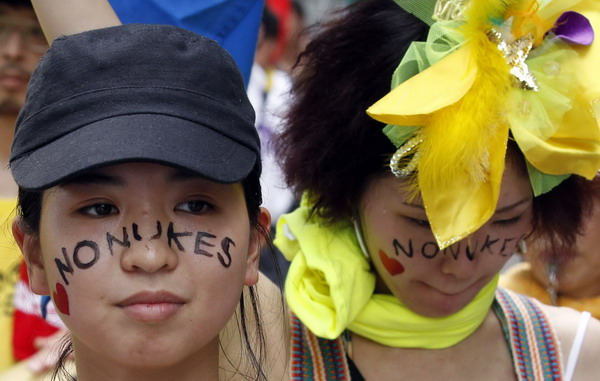 Protesters bearing anti-nuclear face-painting take part in an anti-nuclear march in Hiroshima August 6, 2011. [Photo/Agencies]
|
E-paper
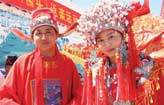
My Chinese Valentine
Local businesses are cashing in on a traditional love story involving a cow herder and a goddess
Outdoor success
Lifting the veil
Allure of mystery
Specials
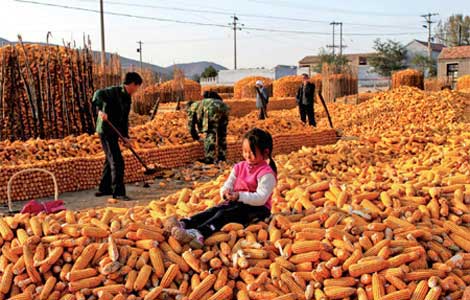
Sowing the seeds of doubt
The presence in China of multinationals such as Monsanto and Pioneer is sparking controversy

Lifting the veil
Beijing's Palace Museum, also known as the Forbidden City, is steeped in history, dreams and tears, which are perfectly reflected in design.

Beer we go
Early numbers not so robust for Beijing's first international beer festival
